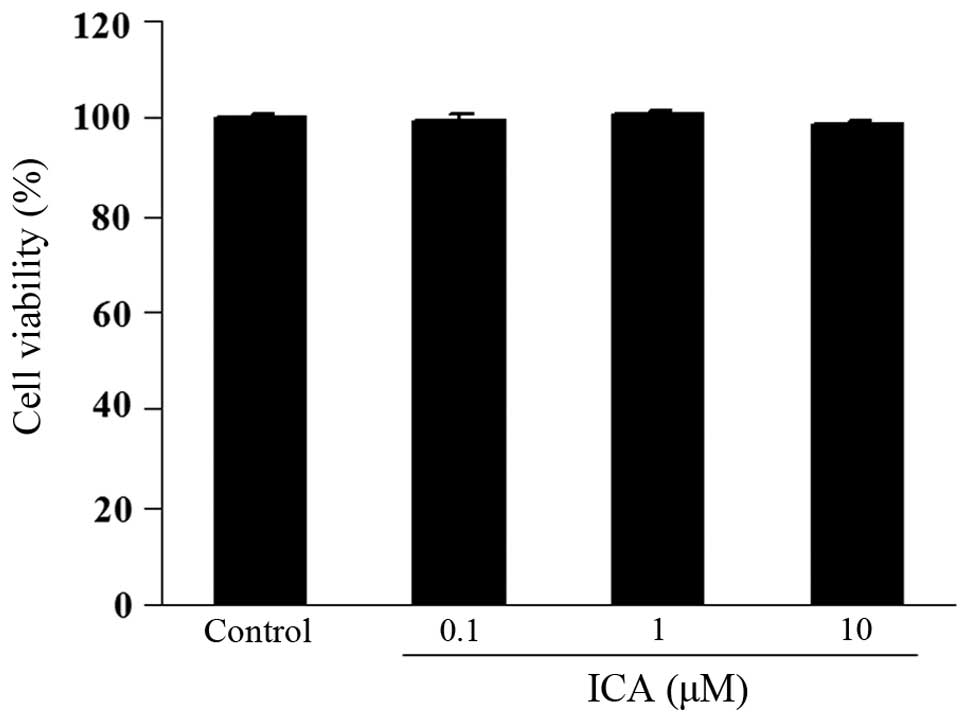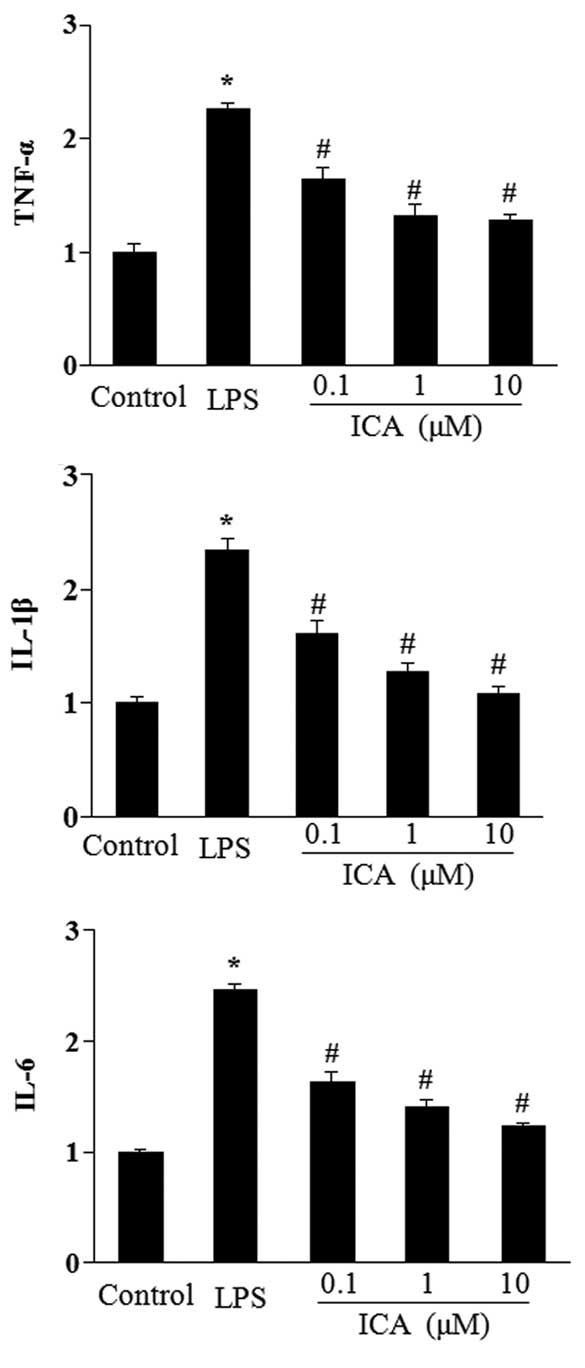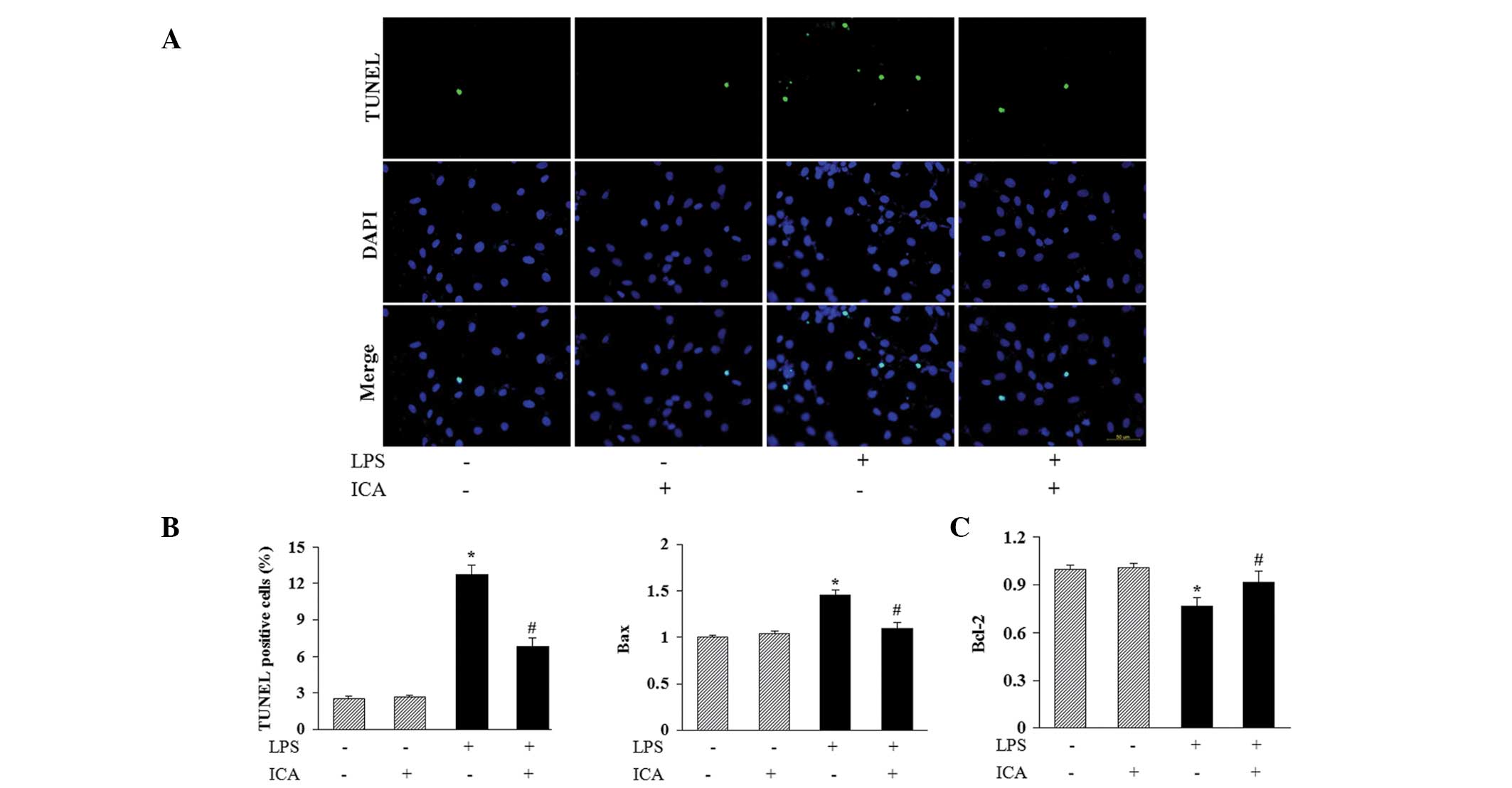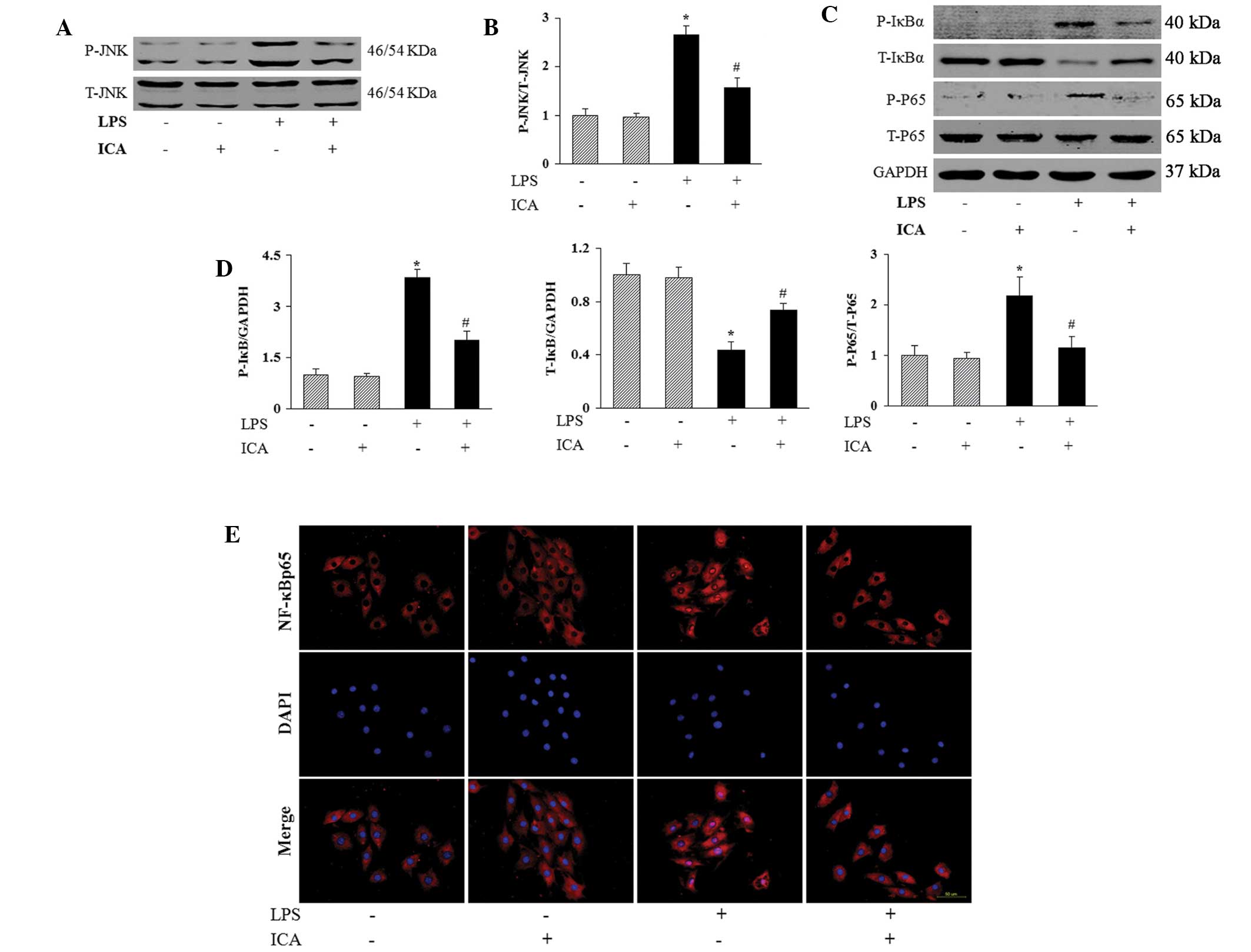|
1
|
Coggins M and Rosenzweig A: The fire
within: cardiac inflammatory signaling in health and disease. Circ
Res. 110:116–125. 2012. View Article : Google Scholar : PubMed/NCBI
|
|
2
|
Hohensinner PJ, Niessner A, Huber K,
Weyand CM and Wojta J: Inflammation and cardiac outcome. Curr Opin
Infect Dis. 24:259–264. 2011. View Article : Google Scholar : PubMed/NCBI
|
|
3
|
Atefi G, Zetoune FS, Herron TJ, et al:
Complement dependency of cardiomyocyte release of mediators during
sepsis. FASEB J. 25:2500–2508. 2011. View Article : Google Scholar : PubMed/NCBI
|
|
4
|
Avlas O, Fallach R, Shainberg A, Porat E
and Hochhauser E: Toll-like receptor 4 stimulation initiates an
inflammatory response that decreases cardiomyocyte contractility.
Antioxid Redox Signal. 15:1895–1909. 2011. View Article : Google Scholar
|
|
5
|
Fallach R, Shainberg A, Avlas O, et al:
Cardiomyocyte Toll-like receptor 4 is involved in heart dysfunction
following septic shock or myocardial ischemia. J Mol Cell Cardiol.
48:1236–1244. 2010. View Article : Google Scholar : PubMed/NCBI
|
|
6
|
Hua F, Ha T, Ma J, et al: Protection
against myocardial ischemia/reperfusion injury in TLR4-deficient
mice is mediated through a phosphoinositide 3-kinase-dependent
mechanism. J Immunol. 178:7317–7324. 2007. View Article : Google Scholar : PubMed/NCBI
|
|
7
|
Satoh M, Nakamura M, Akatsu T, Shimoda Y,
Segawa I and Hiramori K: Toll-like receptor 4 is expressed with
enteroviral replication in myocardium from patients with dilated
cardiomyopathy. Lab Invest. 84:173–181. 2004. View Article : Google Scholar
|
|
8
|
Frantz S, Kobzik L, Kim YD, et al: Toll4
(TLR4) expression in cardiac myocytes in normal and failing
myocardium. J Clin Invest. 104:271–280. 1999. View Article : Google Scholar : PubMed/NCBI
|
|
9
|
Ha T, Li Y, Hua F, et al: Reduced cardiac
hypertrophy in toll-like receptor 4-deficient mice following
pressure overload. Cardiovasc Res. 68:224–234. 2005. View Article : Google Scholar : PubMed/NCBI
|
|
10
|
Xu CQ, Liu BJ, Wu JF, et al: Icariin
attenuates LPS-induced acute inflammatory responses: involvement of
PI3K/Akt and NF-kappaB signaling pathway. Eur J Pharmacol.
642:146–153. 2010. View Article : Google Scholar : PubMed/NCBI
|
|
11
|
Wu J, Zhou J, Chen X, et al: Attenuation
of LPS-induced inflammation by ICT, a derivate of icariin, via
inhibition of the CD14/TLR4 signaling pathway in human monocytes.
Int Immunopharmacol. 12:74–79. 2012. View Article : Google Scholar
|
|
12
|
Li WW, Gao XM, Wang XM, Guo H and Zhang
BL: Icariin inhibits hydrogen peroxide-induced toxicity through
inhibition of phosphorylation of JNK/p38 MAPK and p53 activity.
Mutat Res. 708:1–10. 2011. View Article : Google Scholar : PubMed/NCBI
|
|
13
|
Song YH, Cai H, Gu N, Qian CF, Cao SP and
Zhao ZM: Icariin attenuates cardiac remodelling through
down-regulating myocardial apoptosis and matrix metalloproteinase
activity in rats with congestive heart failure. J Pharm Pharmacol.
63:541–549. 2011. View Article : Google Scholar : PubMed/NCBI
|
|
14
|
Chung BH, Kim JD, Kim CK, et al: Icariin
stimulates angiogenesis by activating the MEK/ERK- and
PI3K/Akt/eNOS-dependent signal pathways in human endothelial cells.
Biochem Biophys Res Commun. 376:404–408. 2008. View Article : Google Scholar : PubMed/NCBI
|
|
15
|
Zhou H, Bian ZY, Zong J, et al: Stem cell
antigen 1 protects against cardiac hypertrophy and fibrosis after
pressure overload. Hypertension. 60:802–809. 2012. View Article : Google Scholar : PubMed/NCBI
|
|
16
|
Zhou H, Yang HX, Yuan Y, et al:
Paeoniflorin attenuates pressure overload-induced cardiac
remodeling via inhibition of TGFβ/Smads and NF-κB pathways. J Mol
Histol. 44:357–367. 2013. View Article : Google Scholar : PubMed/NCBI
|
|
17
|
Zhou H, Shen DF, Bian ZY, et al:
Activating transcription factor 3 deficiency promotes cardiac
hypertrophy, dysfunction, and fibrosis induced by pressure
overload. PLoS One. 6:e267442011. View Article : Google Scholar : PubMed/NCBI
|
|
18
|
Pan LL, Liu XH, Gong QH and Zhu YZ:
S-Propargyl-cysteine (SPRC) attenuated lipopolysaccharide-induced
inflammatory response in H9c2 cells involved in a hydrogen
sulfide-dependent mechanism. Amino Acids. 41:205–215. 2011.
View Article : Google Scholar : PubMed/NCBI
|
|
19
|
Dong M, Hu N, Hua Y, et al: Chronic Akt
activation attenuated lipopolysaccharide-induced cardiac
dysfunction via Akt/GSK3β-dependent inhibition of apoptosis and ER
stress. Biochim Biophys Acta. 1832:848–863. 2013. View Article : Google Scholar : PubMed/NCBI
|
|
20
|
González A, Ravassa S, Beaumont J, López B
and Díez J: New targets to treat the structural remodeling of the
myocardium. J Am Coll Cardiol. 58:1833–1843. 2011. View Article : Google Scholar : PubMed/NCBI
|
|
21
|
Verma SK, Krishnamurthy P, Barefield D, et
al: Interleukin-10 treatment attenuates pressure overload-induced
hypertrophic remodeling and improves heart function via signal
transducers and activators of transcription 3-dependent inhibition
of nuclear factor-κB. Circulation. 126:418–429. 2012. View Article : Google Scholar : PubMed/NCBI
|
|
22
|
Zeng KW, Fu H, Liu GX and Wang XM: Icariin
attenuates lipopolysaccharide-induced microglial activation and
resultant death of neurons by inhibiting TAK1/IKK/NF-kappaB and
JNK/p38 MAPK pathways. Int Immunopharmacol. 10:668–678. 2010.
View Article : Google Scholar : PubMed/NCBI
|
|
23
|
Mann DL: Inflammatory mediators and the
failing heart: past, present, and the foreseeable future. Circ Res.
91:988–998. 2002. View Article : Google Scholar : PubMed/NCBI
|
|
24
|
Wang YK and Huang ZQ: Protective effects
of icariin on human umbilical vein endothelial cell injury induced
by H2O2 in vitro. Pharmacol Res. 52:174–182. 2005. View Article : Google Scholar : PubMed/NCBI
|
|
25
|
Tien YC, Lin JY, Lai CH, et al: Carthamus
tinctorius L. prevents LPS-induced TNFalpha signaling activation
and cell apoptosis through JNK1/2-NFkappaB pathway inhibition in
H9c2 cardiomyoblast cells. J Ethnopharmacol. 130:505–513. 2010.
View Article : Google Scholar : PubMed/NCBI
|
|
26
|
Ceylan-Isik AF, Zhao P, Zhang B, Xiao X,
Su G and Ren J: Cardiac overexpression of metallothionein rescues
cardiac contractile dysfunction and endoplasmic reticulum stress
but not autophagy in sepsis. J Mol Cell Cardiol. 48:367–378. 2010.
View Article : Google Scholar :
|
|
27
|
Jones WK, Brown M, Ren X, He S and
McGuinness M: NF-kappaB as an integrator of diverse signaling
pathways: the heart of myocardial signaling? Cardiovasc Toxicol.
3:229–254. 2003. View Article : Google Scholar : PubMed/NCBI
|
|
28
|
Liu Q, Chen Y, Auger-Messier M and
Molkentin JD: Interaction between NFκB and NFAT coordinates cardiac
hypertrophy and pathological remodeling. Circ Res. 110:1077–1086.
2012. View Article : Google Scholar : PubMed/NCBI
|
|
29
|
Hayden MS and Ghosh S: Shared principles
in NF-kappaB signaling. Cell. 132:344–362. 2008. View Article : Google Scholar : PubMed/NCBI
|



















